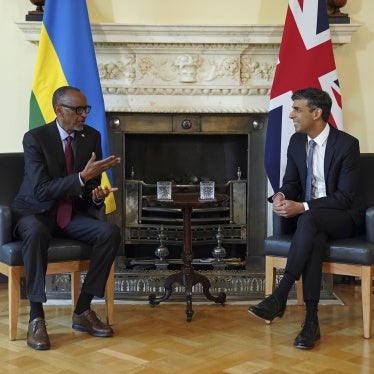Germany should support Russian civil society by insisting that President Vladimir Putin take concrete steps to improve human rights in Russia, three leaders of Russian nongovernmental organizations said today in Berlin.
“All the European countries ought to stand up for Russian civil society, but Germany should be leading the way,” said Lokshina of DEMOS. “With the Putin government trying to suppress all dissent, we need you now more than ever.”
The three raised concerns that EU members – and in particular Germany, which plays a leading role on Russia in Europe, not only because it holds the current EU presidency but also because of its special relationship with Moscow – were guided too much by economic interests. They focused especially on the EU’s desire to secure energy supplies.
“Speaking out on human rights in Russia won’t threaten Europe’s energy supply but it would really help to curb the government’s crackdown,” said Memorial’s Orlov. “Russian civil society is under attack and we need Germany to speak up.”
The excessive violence and force used to break up the recent peaceful political demonstrations in Moscow and St. Petersburg highlight the increasing pressure on civil society in Russia, the human rights defenders said.
“This police violence is just the latest sign of growing government hostility toward peaceful dissent in Russia,” said Dzhibladze of the Centre for the Development of Democracy and Human Rights. “It’s part of an effort to silence the political opposition, human rights defenders, and independent media in Russia.”
The three human rights defenders stressed that Germany and the other EU members were not promoting human rights as well as they should in dialogue with Russia. The clearest example is Europe’s striking failure to respond effectively to the continuing, pervasive impunity for grave human rights violations in Chechnya, the single largest human rights crisis in Europe today. It is the only place in Europe where the civilian population faces systematic torture, often perpetrated in unacknowledged, illegal places of detention, as well as summary executions and forced disappearances.
Despite eight recent rulings by the European Court of Human Rights, which has found Russia responsible for serious abuses in Chechnya, European governments have not put pressure on Russia to take any meaningful steps to curb these atrocities. The Kremlin has the power to rein in its Chechen proxies, responsible for most of these abuses, but instead it supports them unconditionally and blocks investigations into their misconduct, the three human rights defenders said.
“Germany and the rest of Europe should insist that President Putin implements the European Court of Human Rights rulings,” said Lokshina. “Moscow should investigate and prosecute atrocities in Chechnya, compensate its victims and make the systemic changes to end torture and other atrocities. But that won’t happen without a push from Europe.”







